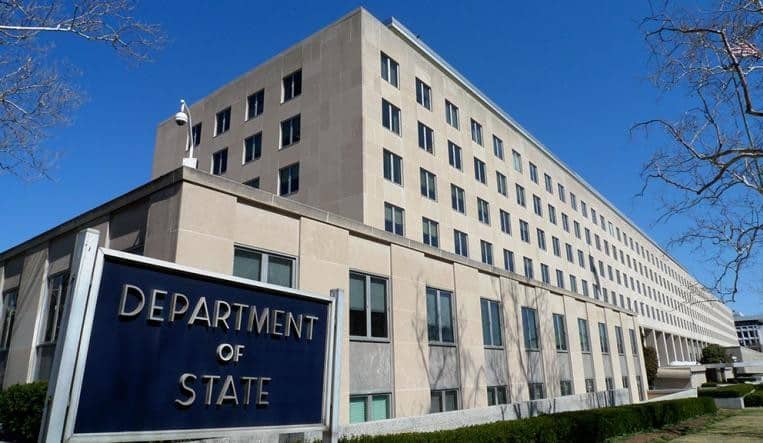6 de septiembre 2022

News About Sheynnis Palacios Not Covered by Media Operating in Nicaragua

PUBLICIDAD 1M
PUBLICIDAD 4D
PUBLICIDAD 5D
State Department details how the Nicaraguan economy works, including the opacity with which the regime operates in its relations with investors

State Department details how the Nicaraguan economy works including the opacity with which the regime operates in its relations with investors
The recommended “extreme caution” to those planning to invest in Nicaragua, considering the tense business environment that dominates the country; the political instability that stifles freedoms, and the four years of crisis affecting the economy, all of which raises the country risk to levels that are not recommendable for investment.
If the world economy came to a halt as of March 2020, at the beginning of the covid-19 pandemic, the same thing happened in Nicaragua two years earlier, as a reaction to the repression unleashed by the regime of Daniel Ortega and Rosario Murillo against citizens who civically protested during the so-called ‘April Rebellion’.
“The regime of President Ortega and Vice President Murillo continues to suspend constitutionally guaranteed civil rights, detain political prisoners, and disregard the rule of law, creating an unpredictable investment climate plagued by reputational risks and arbitrary regulations”, he U.S. warning states.
This statement comes because “in 2020, the National Assembly passed six repressive laws that alarmed investors,” referring to, among others, “a Gag Rule that criminalizes political speech; a Foreign Agents Act that requires organizations and individuals to report foreign assistance and prevents anyone receiving foreign funding from running for office; and a Consumer Protection Act that could prevent financial institutions from making independent decisions about whether to serve financial customers, including OFAC-sanctioned entities.”
Echoing multiple complaints filed anonymously by businessmen, it states that tax authorities seized property after allegedly collecting arbitrary taxes, and imprisoned individuals without due process, until they paid those taxes. “Arbitrary fines and customs inspections harm foreign companies that import products,” the text reiterated.
Referring to the “deepening authoritarianism of the Ortega-Murillo regime”, it mentions that “almost all international financial institutions have stopped granting new loans to Nicaragua, and external financing will drop drastically beyond 2022”, as well as the regime's hope that the establishment of relations with China, after breaking with Taiwan, will provide “new investments and financing to compensate for its growing isolation”.
In an effort to balance its warning, the text notes that “Nicaragua's economy still has significant growth potential if investor confidence can be restored by strengthening institutions and improving the rule of law.”
Among the country's main assets, they include ample natural resources; a well-developed agricultural sector; an organized and sophisticated private sector committed to a free economy; easy access to major shipping lanes; and a young, low-cost labor force that supports the manufacturing sector.”
The State Department also points out to its citizens that Nicaragua seeks foreign direct investment “to project normalcy” and ensure that it has international support, but as traditional sources of foreign investment have diminished, the Government has increasingly sought investment from ‘friendly countries’ such as Iran, Russia, and China.
They also clarify that investment incentives are targeted at export-focused companies that require large amounts of unskilled or low-skilled labor.
Other observations include the warning that “foreign investors report significant delays in receiving residency permits, requiring frequent trips out of the country to renew visas,” and that ProNicaragua, the official investment and export promotion agency, “is highly politicized” and is headed by the sanctioned Laureano Ortega Murillo, son of the presidential couple.
In explaining how Nicaragua works, they point out the benefit of having “personal connections and affiliation with influential industry associations and chambers of commerce,” and that while municipalities and ministries can enact decisions relevant to foreign companies, all actions are subject to the de facto approval of the presidency. “In practice, Ortega and Murillo maintain de facto review authority over any foreign investment...process that is not transparent,” he reflects.
Then, on business facilitation, it explains that “while the Nicaraguan government is eager to attract foreign investment, it lacks a systematic business facilitation effort and instead relies on individual engagement with potential investors,” in keeping with old accusations that point to the importance of having a line of communication with Ortega that is as direct as possible.
Finally, they warn that the country does not have an online business registration system, despite the fact that, for tax purposes, they must register with the General Directorate of Revenue, the Nicaraguan Institute of Social Security, and their respective municipality, records that “are not normally available to the public”. Also, according to the Ministry of Development, Industry and Commerce, registering a company takes a minimum of 14 days, but usually takes much longer, such as the eight procedures and 42 days required to establish a foreign-owned limited liability company.
This article was originally published in Spanish in Confidencial and translated by our staff
Archivado como:
PUBLICIDAD 3M
Periodista nicaragüense, exiliado en Costa Rica. Durante más de veinte años se ha desempeñado en CONFIDENCIAL como periodista de Economía. Antes trabajó en el semanario La Crónica, el diario La Prensa y El Nuevo Diario. Además, ha publicado en el Diario de Hoy, de El Salvador. Ha ganado en dos ocasiones el Premio a la Excelencia en Periodismo Pedro Joaquín Chamorro Cardenal, en Nicaragua.
PUBLICIDAD 3D